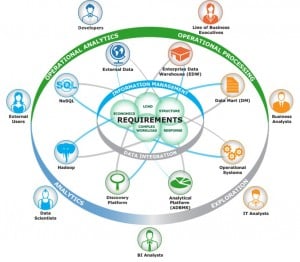As an analyst who focuses on network management research, I am particularly intrigued by software-defined networking (SDN). As SDN architectures are deployed in data centers, local area networks and WANs, network management practices will have to evolve. For instance, SDN may make it easier for cloud administrators to provision network services and connectivity for a new application, but how do you ensure that your new programmable network remains compliant with configuration controls and policies? Is your performance management tool able to model and monitor an SDN controller? If you have traditionally relied about appliance-based load balancers and firewalls in your data center, how do you monitor and manage those network functions when they become virtualized services that are as mobile and dynamic as the workloads they serve?
SDN and Network Management at ONUG
By Shamus McGillicuddy on May 12, 2015 9:13:36 AM
Best Practices for Maximizing Efficiencies – Governance and Optimization
By Dennis Drogseth on May 8, 2015 12:56:04 PM
In my last blog, I talked about “IT Cultural Transformation and the Elimination of Technology Silos.” That blog keyed on four key areas of advice, which also provide a useful foundation for the topic of “Governance and Optimization.” These key areas include: Standing in the middle of the storm –This means looking at the interdependencies [...]
Rewarding Impatience with User Self-Service
By Steve Brasen on Apr 27, 2015 7:34:39 AM
There seems to be a direct correlation between how successful business professionals are and their level of impatience. While I am not familiar with any studies on this particular subject, it is simple logic that the most productive employees are those who most frequently demand rapid response to service requests. From my past experience managing and providing IT administrative support, I can attest that these individuals are usually the most irritating—constantly requesting access to new applications, data, and other business resources with expectations of an immediate response. Begrudgingly, I must acknowledge that these are the folks who are also most likely to close deals, beat deadlines, increase revenues, and win awards. In the modern world of highly competitive markets and increased organizational requirements, impatience may actually be a virtue.
Business Process Management in the Real World — Why It’s Important to Govern Both Automated and Manual Processes
By Steve Brasen on Apr 13, 2015 10:15:12 AM
In a perfect world, all business processes would be automated and all work tasks would be accomplished with the click of a button. This idyllic work experience seems to be the realization of Plato’s utopia…or, if you prefer, the world of the Jetsons. Regrettably, however, we clearly do not live in a perfect world. Put simply, while any repeatable process can be automated, not every process is repeatable, so automation is not a practical solution in all cases. This is particularly a problem for enterprises since business productivity is almost entirely dependent on the rapid and accurate performance of business processes.
Vectra Provides Pervasive Visibility & Analysis to Detect Cyber Attacks
By David Monahan on Apr 9, 2015 2:21:39 PM
Though cyber attacks have been around for years, in 2014 there was an explosion in the volume of attacks and a marked increase in the losses and damages they inflicted. In 2015, this does not seem to be lightening up.
Avoiding Enterprise Mobile Management: A Futile Exercise in Procrastination
By Steve Brasen on Mar 30, 2015 9:38:31 AM
IT operations managers are cringing all around the world – desperately trying to avoid those inevitable words from their executive management: “You need to support enterprise mobility.” Their concerns are understandable. After all, IT administrators are already overtaxed with supporting desktop, server, application, and infrastructure management requirements. Asking them to layer a whole new management discipline on top of that can be a daunting prospect. IT managers who find themselves in this predicament often recognize it as an opportunity to practice the fine art of procrastination. Particularly skilled procrastinators will employ one or more of the following excuses:
IT Cultural Transformation and The Elimination of Technology Silos—An Exercise in Efficiency or a Dream Turned Nightmare?
By Dennis Drogseth on Mar 13, 2015 12:48:19 PM
Cultural transformation and eliminating IT silos may sound like an impossible dream—and indeed, perhaps “eliminating” is too strong a word. But the reality is that IT organizations must change toward a more responsive, business-aligned culture, as well as toward a more service-aware (versus siloed) way of working. So how do you begin? A lot depends, [...]
Developing an Information Management Strategy Within the EMA Hybrid Data Ecosystem
By John Myers on Mar 13, 2015 9:24:56 AM
Enterprise Management Associates (EMA) has recognized that big data implementers and consumers rely on a variety of platforms to meet their big data requirements. These platforms include new data management technologies such as Hadoop, MongoDB, and Cassandra, but the collection also includes traditional SQL-based data management technologies supporting data warehouses and data marts; operational support systems such as customer relationship management (CRM) and enterprise resource planning (ERP); and cloud-based platforms. EMA refers to this collection of platforms as the Hybrid Data Ecosystem (HDE):
Leveraging User Activity Monitoring to Protect Information and Employees from Cyber Threats
By David Monahan on Mar 4, 2015 2:46:04 PM
Historically, many organizations and personnel have been concerned about user activity monitoring (UAM). Certain business cultures feel that these activities are an invasion of privacy or are distrustful. However, in today’s Internet connected, data driven world, having specific information or data means the difference in being a market leader and being out of business.
Docker acquires SocketPlane for multi-host container networking
By Shamus McGillicuddy on Mar 4, 2015 2:36:21 PM
Docker Inc. acquired networking startup SocketPlane today, indicating that Docker wants to accelerate the development of networking APIs and software that will help network managers operationalize production Linux containers. Docker is a suite of open source software that helps developers and admins manage and scale their use of Linux containers. Containers offer the same resource [...]





